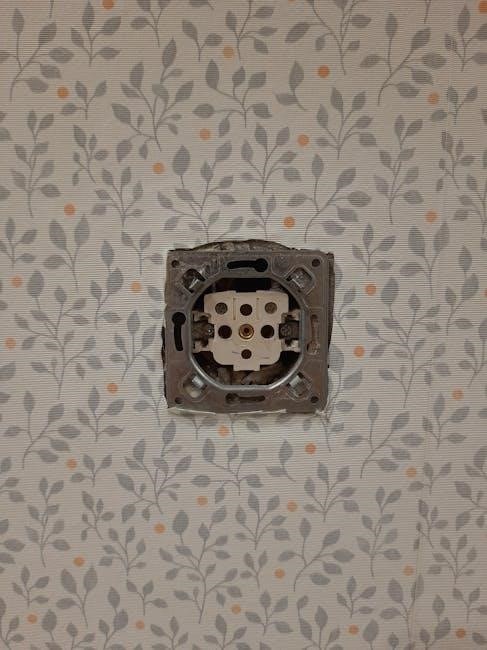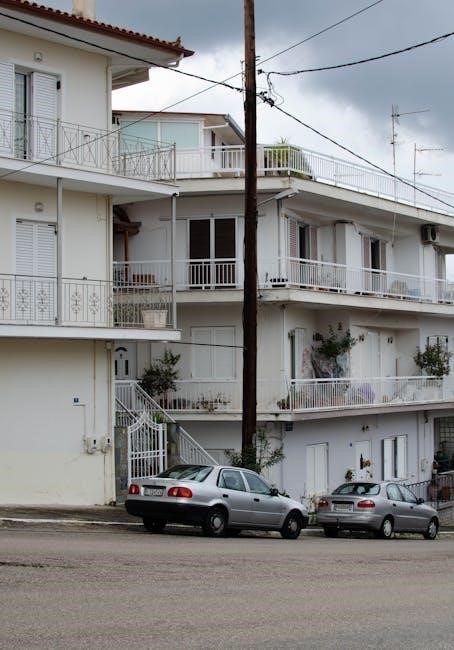residential electrical code pdf

residential electrical code pdf
Residential electrical codes ensure safety and compliance in home wiring systems. Regular reviews by authorities like the SCDF guarantee updates for new technologies and hazard prevention‚ promoting safer living environments.
Definition and Purpose
Residential electrical codes are standardized rules governing safe electrical installations in homes. Their purpose is to protect people‚ property‚ and the environment from electrical hazards. These codes outline requirements for materials‚ wiring practices‚ and safety measures‚ ensuring reliable and hazard-free electrical systems. They apply to new constructions‚ renovations‚ and repairs‚ and are regularly updated by authorities to reflect advancements in technology and safety standards.
Importance of Compliance
Compliance with residential electrical codes is crucial for preventing fires and ensuring safety. It protects people from electrical shocks and hazards‚ while also safeguarding property. Non-compliance can lead to legal penalties and increased insurance costs. By adhering to codes‚ homeowners ensure their systems are reliable and meet safety standards. Regular inspections and updates help maintain compliance‚ reducing risks and promoting a safer living environment. Authorities enforce these codes to protect communities.

Key Components of Residential Electrical Codes
Residential electrical codes outline essential standards for safe wiring‚ circuit design‚ and grounding. These components ensure systems function reliably‚ protecting against electrical hazards and ensuring compliance with safety regulations.
Wiring and Circuit Requirements
Residential electrical codes specify standards for wiring materials‚ circuit design‚ and installation practices. These requirements ensure systems operate safely‚ efficiently‚ and reliably. Proper wiring and circuit configurations prevent overheating‚ short circuits‚ and electrical fires. Codes also address voltage‚ amperage‚ and grounding to protect occupants and property. Regular reviews‚ like those by the SCDF‚ ensure these standards adapt to new technologies and safety advancements‚ maintaining a secure electrical environment for homes.
Grounding and Safety Standards
Residential electrical codes emphasize proper grounding systems to protect against shocks and electrocution. Safety standards ensure all metal parts are bonded‚ and grounding electrodes are installed correctly. These measures safeguard equipment and occupants by providing a safe path for fault currents. Regular inspections and adherence to updated codes‚ like those reviewed by authorities such as the SCDF‚ help maintain these critical safety protocols in every home.

Compliance with Residential Electrical Codes
Compliance ensures electrical systems meet safety standards‚ reducing fire risks. Regular reviews by authorities like the SCDF keep codes updated‚ protecting lives and property effectively always.

Obtaining Permits and Inspections
Obtaining permits ensures electrical work meets safety standards‚ while inspections verify compliance. Authorities like the SCDF conduct regular reviews to update codes‚ preventing hazards and protecting lives effectively through strict enforcement of regulations and ensuring all installations are up-to-date with current safety measures for residential properties.
Consequences of Non-Compliance
Non-compliance with residential electrical codes poses significant risks‚ including electrical fires and safety hazards‚ as highlighted by constant fire incidents. Legal penalties‚ fines‚ and property damage are potential outcomes. Authorities like the SCDF enforce strict regulations to prevent such consequences‚ ensuring adherence to updated codes to safeguard lives and property‚ while avoiding costly repairs and legal repercussions for homeowners and contractors alike.

Best Practices for Residential Electrical Systems
Adherence to updated codes‚ regular inspections‚ and proper wiring practices are essential. The SCDF’s code reviews highlight the importance of staying informed to prevent electrical hazards and ensure safety.
Hiring Licensed Electricians
Hiring licensed electricians is crucial for ensuring compliance with residential electrical codes. They possess the expertise to install‚ inspect‚ and repair systems safely. Licensed professionals minimize risks‚ adhere to safety standards‚ and ensure code compliance‚ reducing the likelihood of electrical hazards. Their knowledge of updated regulations and best practices guarantees reliable and efficient electrical solutions for homes‚ promoting long-term safety and functionality.
Regular Maintenance and Updates
Regular maintenance and updates are essential for maintaining electrical system safety and efficiency. This includes inspecting wiring‚ circuits‚ and grounding systems to ensure compliance with current codes. Updates address emerging technologies and safety standards‚ preventing potential hazards. Routine checks by licensed professionals help identify and resolve issues early‚ ensuring reliable performance and minimizing fire risks‚ thereby protecting property and lives effectively.

Tools and Resources for Understanding Codes
Residential electrical code PDF guides and online platforms provide comprehensive resources for understanding and complying with safety standards‚ ensuring up-to-date information and practical implementation of electrical systems.
Residential Electrical Code PDF Guides
Residential electrical code PDF guides provide detailed‚ accessible resources for understanding safety standards‚ installation requirements‚ and inspection checklists. These documents‚ often updated annually‚ ensure compliance with local regulations and include practical examples. They serve as essential references for electricians‚ homeowners‚ and builders‚ promoting safe electrical practices and reducing fire risks. Regular reviews by authorities like the SCDF ensure these guides reflect current safety priorities and technological advancements.
Online Platforms for Code Lookup
Online platforms offer convenient access to residential electrical codes‚ enabling quick searches and updates. These resources provide interactive tools‚ cross-references‚ and downloadable PDF guides‚ ensuring users stay informed. Platforms like the National Electric Code (NEC) online database and local authority websites offer comprehensive information‚ supporting compliance and safety. Regular updates reflect changes in regulations and new technologies‚ making them indispensable for professionals and homeowners alike.

Enforcement and Inspection Processes
Local authorities enforce electrical codes through inspections‚ ensuring compliance with safety standards. Regular checks and permits guarantee proper installations‚ reducing fire risks and enhancing overall safety.
Role of Local Authorities
Local authorities play a crucial role in enforcing residential electrical codes. They conduct regular inspections to ensure compliance with safety standards‚ review building plans‚ and issue permits. Authorities also provide guidance on code requirements‚ helping homeowners and contractors understand regulations. Their oversight ensures installations meet safety standards‚ reducing fire risks and protecting communities. Proper enforcement maintains reliability and safety in electrical systems.
Common Inspection Checklists
Inspection checklists ensure thorough evaluation of residential electrical systems. They cover wiring integrity‚ circuit breaker functionality‚ grounding systems‚ and compliance with safety standards. Inspectors verify proper installation of outlets‚ switches‚ and lighting fixtures. They also check for overloaded circuits and ensure all components meet code requirements. These checklists help identify potential hazards‚ ensuring safe and reliable electrical systems. Regular updates reflect changes in regulations and new technologies.
Updates and Revisions in Electrical Codes
Electrical codes are regularly reviewed and updated to enhance safety‚ efficiency‚ and adaptability to new technologies. Updates often reflect advancements in materials and installation practices.
Annual Revisions and What to Expect
Annual revisions to residential electrical codes aim to enhance safety‚ efficiency‚ and adaptability to new technologies. Updates often include new safety protocols‚ material standards‚ and installation practices. Authorities like the SCDF review and implement these changes to reduce hazards and improve compliance. Homeowners and professionals should stay informed to ensure their systems meet current requirements. Regular updates help balance safety with practicality‚ addressing emerging challenges in electrical systems.
Adoption of New Technologies
Residential electrical codes increasingly incorporate new technologies to enhance safety and efficiency. Authorities like the SCDF regularly update codes to include advancements such as smart home devices and renewable energy systems. These updates ensure compatibility with modern electrical demands while maintaining safety standards. The adoption of new technologies helps reduce hazards and improves system performance‚ aligning with global trends in electrical safety and innovation.

Challenges in Implementing Electrical Codes
Implementing residential electrical codes faces challenges like cost and time constraints. Balancing safety with practicality requires frequent updates and compliance checks to ensure effective enforcement and adoption.
Cost and Time Constraints
Residential electrical code implementation often faces challenges due to high costs and time-consuming processes. Frequent updates and compliance checks require significant resources‚ balancing safety with practicality. Authorities like the SCDF regularly review and update codes‚ ensuring they adapt to new technologies and hazards‚ but this can strain budgets and timelines for homeowners and contractors aiming to meet strict safety standards effectively.
Balancing Safety with Practicality
Residential electrical codes aim to balance safety and practicality‚ ensuring homes are protected without overly burdening residents. Regular updates by authorities like the SCDF incorporate new technologies‚ addressing potential hazards while considering cost and implementation challenges. This approach ensures that safety standards remain high while keeping solutions feasible for homeowners and contractors‚ promoting compliance without unnecessary complications.

Additional Resources and References
Residential electrical code PDF guides and industry manuals provide essential references. Authorities like the SCDF regularly update these resources to reflect current safety standards and practices.
Industry Standards and Manuals
Industry standards and manuals‚ such as the National Electrical Code (NEC)‚ provide comprehensive guidelines for residential electrical systems. These documents outline safe practices‚ material specifications‚ and installation requirements. Authorities like the SCDF regularly review and update these standards to address emerging technologies and hazards. Residential electrical code PDF guides are often available online‚ offering accessible references for contractors and homeowners to ensure compliance and safety in electrical work.
Training Programs for Compliance
Training programs for compliance with residential electrical codes are essential for electricians and homeowners. These programs cover code interpretations‚ safety protocols‚ and practical applications. Authorities like the SCDF often endorse such initiatives‚ ensuring adherence to updated standards. Residential electrical code PDF guides are frequently used in these trainings‚ providing participants with accessible references to master compliance requirements and stay informed about the latest industry practices and safety measures.